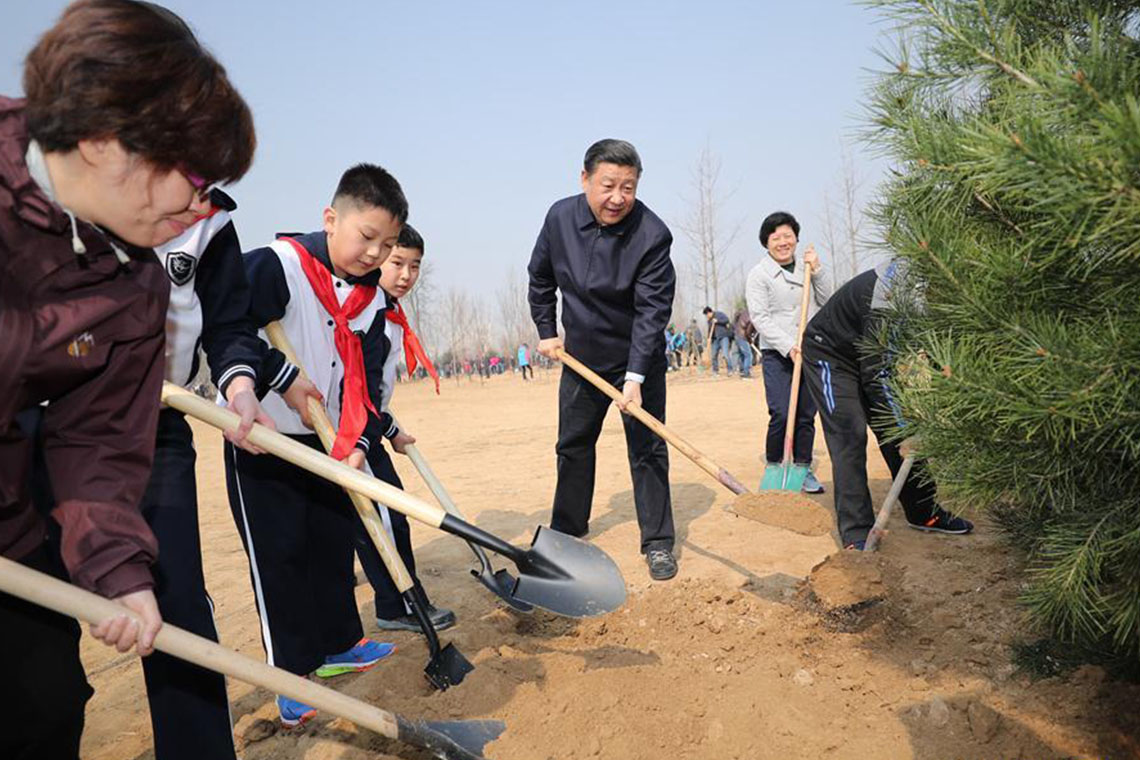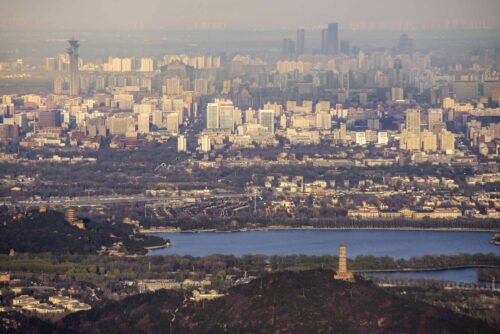Xi plants trees, Trump plans smog
Top China news for March 29, 2017. Get this daily digest delivered to your inbox by signing up at supchina.com/subscribe.

Xi goes green as Trump destroys environmental protections
The top story on the websites of Chinese central state media Xinhua News Agency and People’s Daily today is about a tree-planting activity in eastern Beijing attended by Xi Jinping and all the members of the Politburo Standing Committee except for Li Keqiang, who was on his way back from a visit to Australia and New Zealand. Xi made a call for Chinese citizens to cultivate ecological awareness, to love nature, and to make reforestation a priority from generation to generation. There’s an English summary here, and a longer story in Chinese here.
Meanwhile, the New York Times has headlined a story (paywall) “China poised to take lead on climate after Trump’s move to undo policies,” with a quote from Barbara Finamore of the Natural Resources Defense Council, who says that it is clear China intends “to double down on bringing down their reliance on coal and increasing their use of renewable energy.” The Times has also published an opinion piece by Thomas Friedman, who calls Trump an “agent of the Chinese.” He also questions how America can be great if it does not “dominate the next great global industry — clean power,” in contrast to China, whose “new five-year plan is a rush to electric cars, batteries, nuclear, wind, solar and energy efficiency — and a cap-and-trade system for carbon.”
The coming fiasco in Florida?
Previous Sinica Podcast guest John Pomfret has a piece in the Washington Post that says, “The Trump administration clearly has no China policy and so meeting with China’s leader, Xi Jinping, at this juncture makes no sense. In fact, it could do more harm than good to America’s relations with China.” The article details a record of inconsistency from the Trump team with messaging ranging from strong anti-China rhetoric during the campaign to the incoherence of Secretary of State Rex Tillerson’s statements during his recent Asia trip.
Although there has been no official confirmation from the governments of either country, Hong Kong and U.S. media have reported that Xi and Trump are set to meet in Florida on April 5 and 6. The South China Morning Post reports that Xi will not stay at Trump’s Mar-a-Lago resort during his visit.
New laws in China that take effect on April 1
Today on The China Project, we publish an abridged translation of a set of laws on subjects such as electric vehicles, work permits for foreigners, the minimum wage in Shanghai, and the abolishment of various fees levied on companies.
Detained in China
According to Reuters, ruling party lawmakers and rights groups in Taiwan asked the Chinese government to either “specify the charges against a detained Taiwan human rights activist or release him.” The man, Li Ming-che 李明哲, disappeared in the southern city of Zhuhai on March 19. His wife subsequently confirmed that he had been detained by Chinese authorities. The Associated Press says that he may have been detained because of his discussions on the mobile social networking and messaging service WeChat.
The other ongoing case of an apparently extra-legal detention in China involves an associate professor from the University of Technology Sydney — see “Second bump in Australia-China relations in a week” below for more.
—Jeremy Goldkorn, Editor-in-Chief
This issue of the The China Project newsletter was produced by Sky Canaves, Lucas Niewenhuis, Jia Guo, and Jiayun Feng. More China stories worth your time are curated below, with the most important ones at the top of each section.
BUSINESS AND TECHNOLOGY:
Internet finance risks remain high among Chinese smartphone users
There are about 700 million smartphone users in China and many of them are sending money through apps for transactions, as well as investing through peer-to-peer financing platforms or directly in companies that raise money by crowdfunding. The Wall Street Journal reports (paywall) that around a million companies in China have raised money that way. Chinese households now hold about one-third of the $20 trillion in deposits in banks. However, as consumers have begun to view internet finance schemes as an easier and quicker way to earn money, many of them have shifted to investing in companies, resulting in roughly $200 billion of investment in 2015 and even more last year, according to consulting firm McKinsey & Co.
In January and February, at least 13,000 customers were affected when they couldn’t get repaid after buying $166 million worth of bonds from Chinese electronics maker Cosun Group through an online marketplace owned by Ant Financial Services, an affiliate of ecommerce giant Alibaba. In April last year, about 38,000 investors who had invested more than $2 billion in finance platforms owned by Shanghai Kuailu Investment Group demanded repayment from the company. The company’s owner has since disappeared and investors say they have not been repaid.
- Opinion: Unlocking the potential of Chinese cities – “In recent years, Foshan has transformed itself from a rural county outside Guangzhou, the capital of Guangdong Province, into the most dynamic industrial city in China, with per capita income reaching $17,202 in 2016, compared with $16,624 for Beijing and $16,251 for Shanghai.” / Project Syndicate
- New Google Translate app now available in China as company tries to edge back in / Washington Post
- China’s underground bank crackdown risks headaches in Hong Kong / Bloomberg
- A Chinese company will make killer drones for the Middle East at a factory in Saudi Arabia / Quartz
- Chinese chipmaker Tsinghua Unigroup agrees $22 billion in state financing / Financial Times (paywall)
- Opinion: There’s no crash in China’s future, just years of stagnation / The Hill
POLITICS AND CURRENT AFFAIRS:
Second bump in Australia-China relations in a week
After news yesterday that the Australian government had pulled an increasingly controversial bill to establish extradition procedures with China, diplomats of both countries held emergency meetings today to patch things up. The long-anticipated extradition treaty, originally signed 10 years ago, was expected to be ratified this year, but lower-ranking politicians in the government (“backbenchers”) protested loudly that Australia should not be sending people to China, given complaints about its human rights record.
The pulling of the treaty is the second significant bump in otherwise warm Australia-China relations, the first being the still-unresolved status of politics researcher Feng Chongyi 冯崇义, a Chinese citizen and Australian permanent resident who was held back and questioned repeatedly during a visit to China, and remains in detention. His lawyer has appealed to the Australian government for help in securing his release.
For more on how China has been “trying to fill a Trump vacuum in Australia,” see this Reuters report.
- China steps up university influence effort / The Australian
- China, North Korea open new flight route amid criticism of Beijing sanctions against Pyongyang / SCMP
- On state TV, Chinese forces storm compound a lot like Bin Laden’s / NYT (paywall)
- China building navy’s biggest amphibious assault vessel, sources say / SCMP
- Chongqing VPN users may now face fines of up to 15,000 yuan for jumping over Great Firewall / Shanghaiist
SOCIETY AND CULTURE:
Is China losing its taste for ivory?
Writing in the Washington Post, Simon Denyer reports that “China will close 67 ivory carving factories and retail shops on Friday, roughly one-third of the total,” adding that the country plans to end all domestic ivory sales by the end of the year. The article quotes the chief executive of WildAid, who stated, “These closures prove that China means business in closing down the ivory trade and helping the African elephant.” Moreover, prices for ivory are plunging, according to the organization Save the Elephants, which reports that the average wholesale price of tusks fell to $730 per kilogram in February 2017, down from $2,100 three years ago.
However, it remains to be seen whether the end of legal sales of ivory will stop the trade completely. For a look at some of the challenges facing Africa’s elephants and rhinos, you can listen to our Sinica Podcast on rhino horn and organized crime, from Africa to China and Vietnam.





